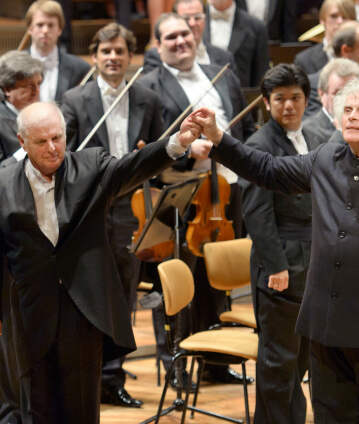Simon Rattle and Daniel Barenboim play Brahms

In this special concert from June 2014, the Berliner Philharmoniker and Daniel Barenboim celebrate the 50th anniversary of their work together with a performance of Brahms’s both technically and musically demanding Piano Concerto No. 1. The soloist is Daniel Barenboim with Sir Simon Rattle conducting. The programme also includes Charles Ives’s The Unanswered Question and Richard Strauss’s Metamorphosen.
The gestation of Brahms’s First Symphony, begun in 1862, lasted a quarter of a century. Hearing behind him “the marching of a giant like Beethoven”, the composer had already tried eight years previously to revise the first movement of a sonata in D minor for two pianos and make it into the first movement of a symphony – but without success. Brahms had a dream that he made a piano concerto out of that “accursed” Symphony – which he eventually did.
“A first movement, a scherzo, and a finale, terribly difficult and grand. I was absolutely transported.” Although it would take another four years before the work was completed, the result, the D minor Concerto op. 15, was something to be truly proud of. With this concerto, Brahms created a highly virtuosic work that, with its symphonic fusion of piano and orchestral roles, left the dimensions of what was expected of a concerto up to that point far behind. Daniel Barenboim, who in the 2013/2014 season celebrated the 50th anniversary of his debut with the Berliner Philharmoniker, is the soloist in Brahms’s powerful and monumental concerto.
The concert opens with Charles Ives’s orchestral piece The Unanswered Question. In this work, written in 1906 (revised 1908), the composer presents “the perennial question of existence” (Ives) seven times, symbolised by a trumpet. Every time, the search for an answer becomes more hectic before the violins fade away (with no response) into the void. Finally, Sir Simon Rattle conducts Richard Strauss’s 1945 Metamorphosen for 23 solo strings, in which the funeral march theme from Beethoven’s Sinfonia Eroica seems to be developed and at the end is quoted explicitly by the double basses in Strauss’s own harmonisation. At this point in the score is the entry “In memoriam” – not without reason did the composer describe the piece as the “reflection” of his “entire past life”.
© 2014 Berlin Phil Media GmbH
Related interview
Artists
Our recommendations
- “Welcome among us”: Concert for fugitives and helpers
- Europakonzert from Athens with Simon Rattle and Daniel Barenboim
- Simon Rattle and Daniel Barenboim with Bartók’s Piano Concerto No. 1
- 1994 Europakonzert from Meiningen with Claudio Abbado and Daniel Barenboim
- A “St Petersburg Night” with Daniel Barenboim and Zubin Mehta at the Waldbühne
- A Beethoven evening with Daniel Barenboim, Itzhak Perlman and Yo-Yo Ma